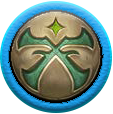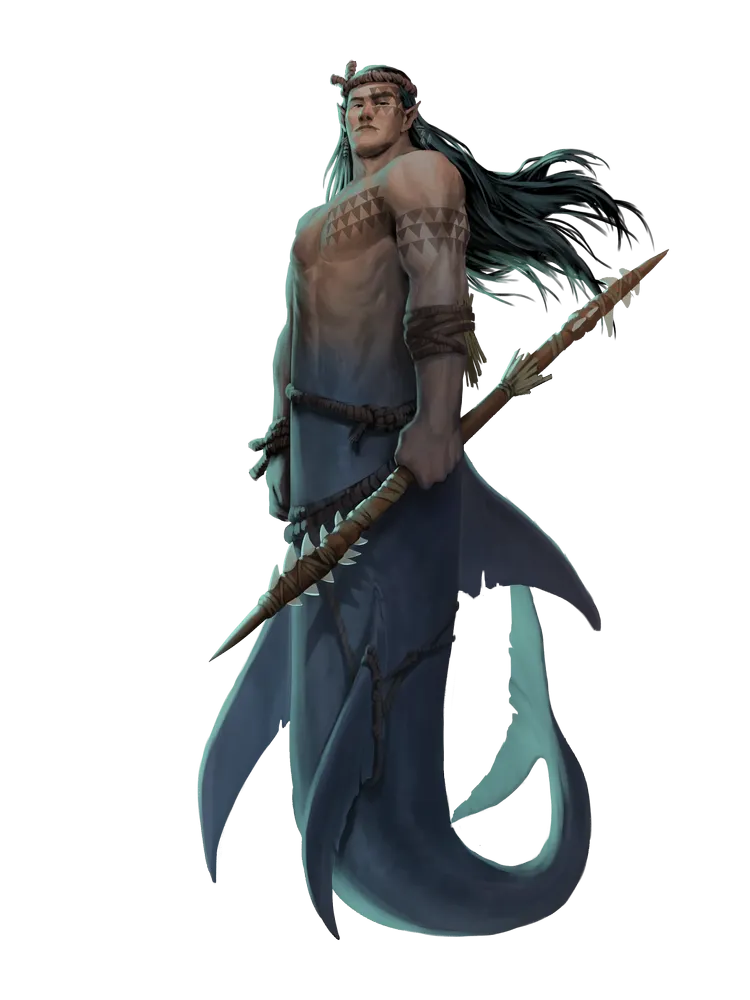
Merfolk
 Uncommon Amphibious Humanoid Merfolk Source Howl of the Wild pg. 35 2.1Merfolk are a half-human, half-fish aquatic people who live in every ocean and sea of Golarion. Merfolk use magic as other peoples might use common tools, especially to control water, create omens, and in their beguiling songs.
Uncommon Amphibious Humanoid Merfolk Source Howl of the Wild pg. 35 2.1Merfolk are a half-human, half-fish aquatic people who live in every ocean and sea of Golarion. Merfolk use magic as other peoples might use common tools, especially to control water, create omens, and in their beguiling songs.Merfolk live in every ocean of Golarion, infinite in their variety and awe-inspiring in their majesty. They consider themselves, not without some merit, the rulers of the sea. Among the tropical reefs of the Fever Sea, merfolk build temples and palaces of brightly colored corals. Beneath the ice floes of the Shining Sea, merfolk hunt seals and whales for food in small, standoffish clans. In the Embaral Ocean, merfolk populate the great trading city of Alohmab, built into the shell of a titanic snail that crawls across the ocean floor.
Though merfolk's everyday lives aren't all that different from those of the surface dwellers above, they have a much more intimate relationship with magic. In the aquatic environment of the open ocean, much that relies on fire and metal is impossible. Instead, merfolk shape sound and water with magic, using them as both tools and weapons. Such skills are widely distributed throughout all merfolk communities, even among those without formal magical training.
If you want to play a character who embodies the grace, wonder, and danger of the sea, you should play a merfolk.
You Might...
- Consider magic a normal tool, something common and useful, rather than a sublime mystery.
- Have a sense of superiority when it comes to the water, whether that be arrogant disdain for anyone who swims or sails or parental concern that they might hurt themselves.
Others Probably...
- Are impressed by your musical and mystical talents.
- Assume that life beneath the waves is vastly different than life on the surface.
Physical Description
Merfolk are among the most distinct ancestries on Golarion; one can't really mistake a merfolk for anything else. From the waist up, merfolk have the bodies of humanoids with powerful bodies and sharp, aquadynamic features. Their eyes are a little larger than those of a human, and many have slightly pointed ears, similar to those of aiuvarins. Below the waist, merfolk have the bodies of great fish, each with a long, scaled tail ending in a fin or pair of fins.
Merfolk come in every color of skin and scale imaginable. Most often, their human bodies have skin tones similar to those of humans or elves living in the same area—the merfolk of the Shackles, for instance, bear a certain similarity to the Lirgeni, while those who live in the Steaming Sea somewhat resemble their Ulfen neighbors. Merfolk who dwell farther from land take on colorations closer to fish tones of blue, gray, or even green. Deep-sea abyssal merfolk have dark gray, midnight blue, or even translucent skin.
Merfolk fish tails are colored similarly to local fish populations. In the temperate zones where most merfolk live, they have iridescent, silvery bodies with traces of gray or blue; tropical merfolk might display patterns of brilliant colors, while those born in the depths might have translucent scales or faintly bioluminescent stripes.
Society
Merfolk can be found in the corners of every ocean, but the largest concentration lives in sprawling aquatic kingdoms on continental shelves, usually in temperate waters teeming with fish. Merfolk look at the deep water in roughly the same way that surface dwellers look at mountains or deserts: some people can live there, but it isn't exactly ideal terrain. Merfolk territories consist of several settled villages and cities, sometimes organized under aristocratic families with courtly politics to rival those found in any Inner Sea monarchy. These political entities pursue active diplomacy with one another, making alliances and trade treaties. Many tend to be more standoffish toward surface dwellers, but some are fascinated by the surface and actively seek to learn about it, whether by using specialized water-filled mobility devices to come onshore or through ancient transformation magics.
Merfolk value magic very highly, and any merfolk hoping to rise to a leadership role is expected to have a powerful grasp of the sorcery of wind, wave, and song. Merfolk kings and queens aren't necessarily the most powerful mages in their territories, but they're usually not far from it, as they have access to a wealth of teachings and artifacts passed down from one generation to the next.
Beliefs
In general, merfolk follow the morals and customs of their parents and the communities in which they were raised. These vary greatly throughout the world. For instance, some merfolk are expected to live harmoniously with nature, while others follow a rigid set of laws ordained by their ancestors. Many merfolk believe that acts of altruism raise a community as a whole, even if they don't immediately produce beneficial results for the one who performed the deed in the first place.
Merfolk worship is, like their societies, diverse. Deities with control over water are placed in high regard, and most communities have a shrine to
Gozreh or one of the Elemental Lords of Water:
Kelizandri or
Lysianassa.
Abadar is a popular god in some larger merfolk settlements, and a version of
Erastil—more associated with sharks than with stags—is worshipped in smaller villages.
Popular Edicts aid one's neighbor whenever possible, bring the beauty of music to the world, protect the seas from threats within and without
Popular Anathema fight the current head-on, use magic to harm innocents or hoard wealth
Adventurers
Merfolk become adventurers for all sorts of reasons, but one thing is certain—the decision to leave home, especially to go and live above the waves, is never taken lightly. Some merfolk adventure to defend their homes or forge alliances with other peoples, while other merfolk are exiles, banished for crimes they might or might not have committed. And of course, some merfolk are just curious about the surface world.
Merfolk come from all kinds of backgrounds— adventurous merfolk might come from the
artisan,
guard,
sailor, or
warrior backgrounds, and merfolk have their share of
emissaries and
nobles as well. With their affinity for magic, many merfolk become
wizards,
witches, or
magi. Less magically inclined merfolk are more likely to become
fighters (having trained in the local militia) or occasionally
rangers, bonding with sharks or other sea life.
Names
Merfolk have as many naming patterns as there are merfolk cultures, but a few tendencies predominate. Dolphin-like clicks and whale-like groans punctuate mellifluous merfolk names, and variances in pitch and tone help distinguish similar names from one another. Merfolk who regularly deal with surface dwellers often adopt names borrowed from local surface cultures, especially since merfolk names tend to sound strange and awkward to their own ears when pronounced in air rather than water.
Sample Names
Aloori, Iri'kik, Ouliette, T'konaa, Uathanak
Other Information
Outsea
By far the strangest community connected to merfolk is that of Outsea, a mid-sized town in the middle of the River Kingdoms, hundreds of miles from the nearest ocean. Long ago, an aquatic mercenary company forged far inlands, only to find that their magic failed them at a critical moment. To everyone’s surprise, they survived and now reside in a magically maintained lake of salt water in the middle of Avistan.
Outsea is home to not just merfolk but also sedacthies, azarketi, nagas, and several other aquatic species. They’re ruled by a military junta, the Council of Generals, and by Danglosa, an anglerfish claiming to be a demigod. The inhabitants are quite martial but also far more comfortable dealing with the surface world than basically any merfolk anywhere else; it’s fair to say that Outsea merfolk are considered unusual by other merfolk.
Merfolk Mechanics
Hit Points
8
Size
Medium
Speed
5 feet
Swim 25 feet
Attribute Boosts
Dexterity
Charisma
Free
Attribute Flaw
Constitution
Languages
CommonThalassicAdditional languages equal to your Intelligence modifier (if it's positive). Choose from
Aklo,
Azlanti,
Draconic,
Elven, and
Fey, and any other languages to which you have access (such as the languages prevalent in your region).
You can see in
dim light as though it were
bright light, so you ignore the
concealed condition due to dim light.
Aquatic Grace
When you roll a success on a saving throw against a
water effect, you get a critical success instead.
Hydration
Your body requires you to return to aquatic environments at least once in a 24-hour period. After the first 24 hours outside of water, you take a –1 status penalty to Fortitude saves. After 48 hours, you struggle to breathe air and begin to
suffocate until returned to water.